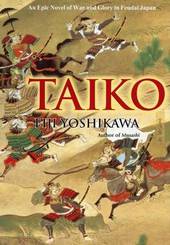
|
Taiko: An Epic Novel Of War And Glory In Feudal Japan
Hardback
Main Details
| Title |
Taiko: An Epic Novel Of War And Glory In Feudal Japan
|
| Authors and Contributors |
Translated by William Scott Wilson
|
|
By (author) Eiji Yoshikawa
|
| Physical Properties |
| Format:Hardback | | Pages:944 | | Dimensions(mm): Height 220,Width 157 |
|
| Category/Genre | Modern and contemporary fiction (post c 1945)
War and combat fiction |
|---|
| ISBN/Barcode |
9781568364285
|
| Classifications | Dewey:895.6344 |
|---|
| Audience | |
|---|
|
Publishing Details |
| Publisher |
Kodansha America, Inc
|
| Imprint |
Kodansha America, Inc
|
| Publication Date |
3 August 2012 |
| Publication Country |
United States
|
Description
In the tempestuous closing decades of the sixteenth century, the Empire of Japan writhes in chaos as the shogunate crumbles and rival warlords battle for supremacy. Warrior monks in their armed citadels block the road to the capital; castles are destroyed, villages plundered, fields put to the torch. Amid this devastation, three men dream of uniting the nation. At one extreme is the charismatic but brutal Nobunaga, whose ruthless ambition crushes all before him. At the opposite pole is the cold, deliberate Ieyasu, wise in counsel, brave in battle, mature beyond his years. But the keystone of this triumvirate is the most memorable of all, Hideyoshi, who rises from the menial post of sandal bearer to become Taiko--absolute ruler of Japan in the Emperor's name. When Nobunaga emerges from obscurity by destroying an army ten times the size of his own, he allies himself with Ieyasu, whose province is weak, but whose canniness and loyalty make him invaluable. Yet it is the scrawny, monkey-faced Hideyoshi--brash, impulsive, and utterly fearless--who becomes the unlikely savior of this ravaged land. Born the son of a farmer, he takes on the world with nothing but his bare hands and his wits, turning doubters into loyal servants, rivals into faithful friends, and enemies into allies. In all this he uses a piercing insight into human nature that unlocks castle gates, opens men's minds, and captures women's hearts. For Hideyoshi's passions are not limited to war and intrigue-his faithful wife, Nene, holds his love dear, even when she must share it; the chaste Oyu, sister of Hideyoshi's chief strategist, falls prey to his desires; and the seductive Chacha, whom he rescues from the fiery destruction of her father's castle, tempts his weakness. As recounted by Eiji Yoshikawa, author of the international best-seller Musashi, Taiko tells many stories- of the fury of Nobunaga and the fatal arrogance of the black-toothed Yoshimoto; of the pathetic downfall of the House of Takeda; how the scorned Mitsuhide betrayed his master; how once impregnable ramparts fell as their defenders died gloriously. Most of all, though, Taiko is the story of how one man transformed a nation through the force of his will and the depth of his humanity. Filled with scenes of pageantry and violence, acts of treachery and self-sacrifice, tenderness and savagery, Taiko combines the panoramic spectacle of a Kurosawa epic with a vivid evocation of feudal Japan.
Author Biography
EIJI YOSHIKAWA was born in 1892 near Tokyo. Beginning his literary career at the age of twenty-two, he continued to work as a journalist while writing novels that reached a large and appreciative readership. At the time of his death in 1962, he was one of Japan's most popular novelists. His memoirs have been translated as Fragments of a Past. WILLIAM SCOTT WILSON, the translator, was born in 1944 and grew up in Fort Lauderdale, Florida. As an undergraduate student at Dartmouth College in 1966, he was invited by a friend to join a three-month kayak trip up the coast of Japan from Shimonoseki to Tokyo. This eye-opening journey, beautifully documented in National Geographic, spurred Wilson's fascination with the culture and history of Japan. After receiving a B.A. degree in political science from Dartmouth, Wilson earned a second B.A. in Japanese language and literature from the Monterey Institute of Foreign Studies in Monterey, California, then undertook extensive research on Edo-period (1603-1868) philosophy at the Aichi Prefectural University, in Nagoya, Japan. Wilson completed his first translation, Hagakure, while living in an old farmhouse deep in the Japanese countryside. Hagakure saw publication in 1979, the same year Wilson completed an M.A. in Japanese language and literature at the University of Washington. Wilson's other translations include The Book of Five Rings, The Life-Giving Sword, The Unfettered Mind, the Eiji Yoshikawa novel Taiko, and Ideals of the Samurai, which has been used as a college textbook on Japanese history and thought. Two decades after its initial publication, Hagakure was prominently featured in the Jim Jarmusch film Ghost Dog.
Reviews"Taiko is simply too good to ignore...Packed with action, intrigue and heartbreak...[it] proves conclusively that Americans aren't the only ones who root for the underdog." -Detroit Free Press "Something for everyone-history, romance, acts of great loyalty and treachery, monumental battle scenes...highly recommended." -San Francisco Chronicle "Eiji Yoshikawa's epic is the real thing, the insider's guide to one of the most periods in Japanese history." -New York Newsday "A unique opportunity for Western readers to explore a time, a man and the creation of modern Japan from a genuinely Japanese perspective." -The Washington Times "A vibrant tale of heroic deeds and black villainy that brings to life distant times and people" -Library Journal
|